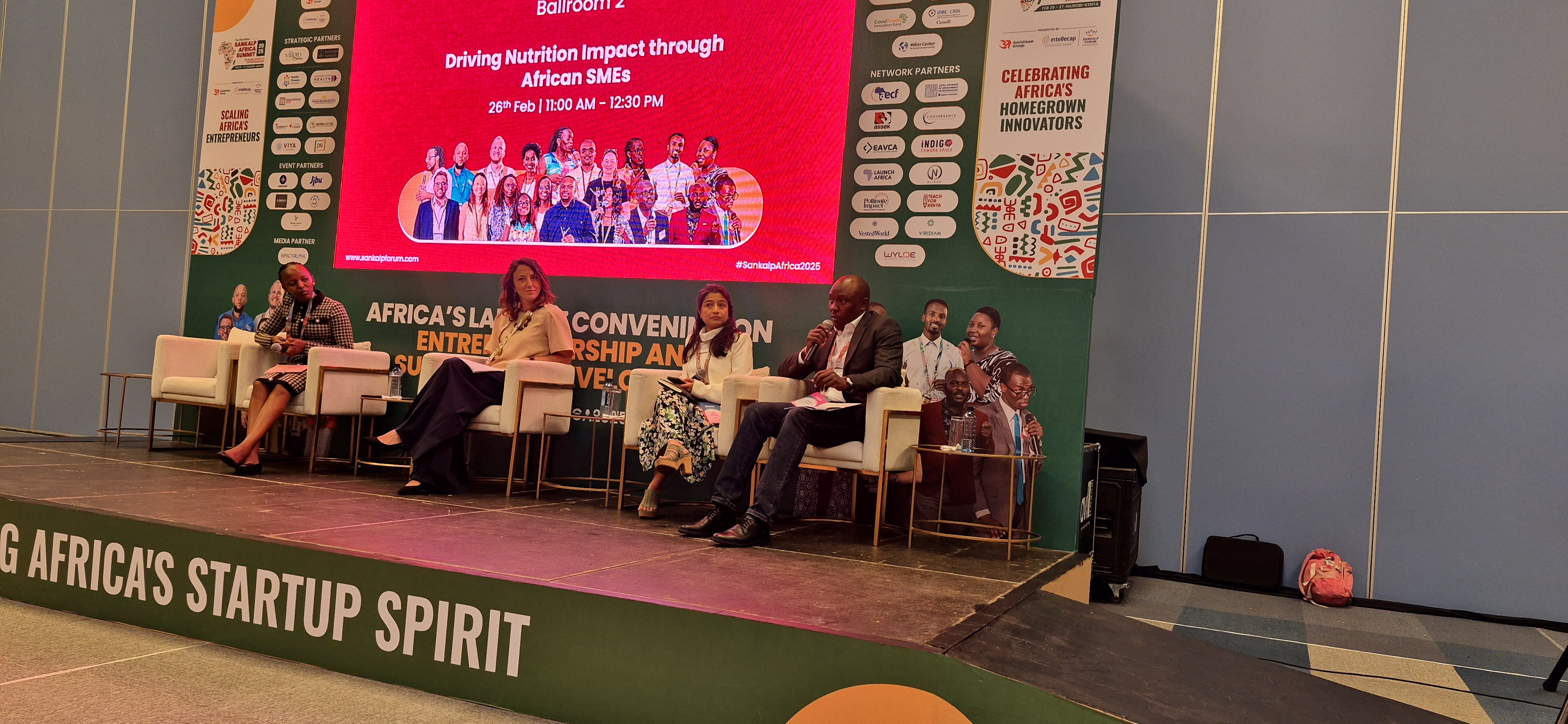Fighting malnutrition in all its forms is one of the major challenges of the 21st century. While more than 820 million people suffer from undernutrition and hunger, with 150 million children under age 5 stunted (too short for their age), another 2 billion people are overweight or obese. With SMEs in Africa producing and distributing approximately 70%-80% of the nutritious foods available on the continent, they are key drivers of food supply, job creation and economic growth. How can they reach lower-income consumers and create sustainable nutrition impact?
In the warmth of sunny Nairobi, the Global Alliance for Improved Nutrition (GAIN), through the Nutritious Foods Financing Facility (N3F) together with 60 Decibels and Camino Ruiz Agencies Ltd convened a session at the Sankalp Africa Summit 2025, to share insights and perspectives on the critical role played by food system SMEs, their challenges in reaching lower-income consumers and sustaining nutrition impact.
Setting the scene, Stella Nordhagen introduced the unique challenges that lower-income consumers face in accessing nutritious foods, including
i. Financial constraints: low-income consumers have limited purchasing power, variable incomes, and may prioritize affordability over nutrition.
ii. Lack of nutrition awareness: limited access to advertising, low literacy, and lack of food labelling enforcement make it harder to educate consumers.
iii. Infrastructure issues: limited cold storage, high perishability, and distribution challenges make nutritious food more expensive and less available.
Key findings of a GAIN study on business models for reaching lower-income consumers showcased innovative business models that have proven effective in reaching lower-income consumers with nutritious food, including the use of lower-cost ingredients, using less-desired parts, smaller package sizes, and last mile distribution networks.
It is exactly these types of business models that the N3F aims to support with financing and technical assistance, enabling them to grow and scale their nutrition impact. As the lead for GAIN’s innovative finance work including the N3F, Roberta Bove explained the rationale for this first-of-its-kind nutrition initiative, highlighting challenges SMEs face in accessing suitable financing, and the concentration of agri-focused funds on crops that may have limited nutritional value and/or are targeted at high-income markets. The N3F is a debt impact fund, providing short- and long-term financing to Sub Saharan African (SSA) SMEs producing or distributing nutritious foods to lower-income consumers on the continent. The fund, implemented in partnership with Incofin, is accompanied by a technical assistance facility to support SMEs in capacity building, with the main goal of increasing access to nutritious food in SSA. To date, N3F has made five investments in Zambia, Kenya, Rwanda, and Senegal.
With N3F being a nutrition-first impact fund and acting as a proof of concept in the market, it is key to successfully track and measure the impact of nutrition-focused SMEs. Venu Aggarwal, Director at monitoring firm 60 Decibels, introduced the partnership between GAIN and 60 Decibels, and highlighted some of the tweaks made to the 60 Decibels’ traditional consumer-focused survey approach to assess potential nutrition impact at the household level, such as by asking about dietary diversity and about who in the household consumes the nutritious food products and with what frequency. The discussion underscored the need for SMEs to track, measure and report on the impact of their business operations, including on consumers of end products. It also highlighted the gaps present in most SMEs regarding tracking consumer data, as well as the potential value of leveraging consumer data for business decision-making.
Joseph Mureithi, founder of Camino Ruiz, a tilapia fish farming and distribution business and a N3F investee, reflected on having worked with 60 Decibels to understand the consumers reached through their channels in Kenya. He highlighted the potential of SMEs to reach consumers with nutritious products, while noting that this requires access to financing and technical assistance and a supportive business and regulatory environment. In particular, he shared Camino Ruiz’s experience in reaching lower-income consumers with smaller package sizes, lower prices, and selling through small vendors known as ‘mama samaki’.

Picture 1: Panelists while engaging in the discussion
Overall, the session underscored the critical role of African SMEs in tackling nutrition challenges and the need for coordinated efforts between investors, entrepreneurs, and policymakers to scale sustainable solutions in Africa’s food systems. Several SME representatives participating in the session were highly engaged, from producers of children’s food to cold chain providers across the continent. The session concluded with a question we now pose to you: What role can you play in supporting nutrition-focused SMEs to reach the most vulnerable and lower-income consumers in Africa?
The findings, ideas, and conclusions contained within are those of the authors and do not necessarily reflect positions or policies of any of GAIN’s funding partners.